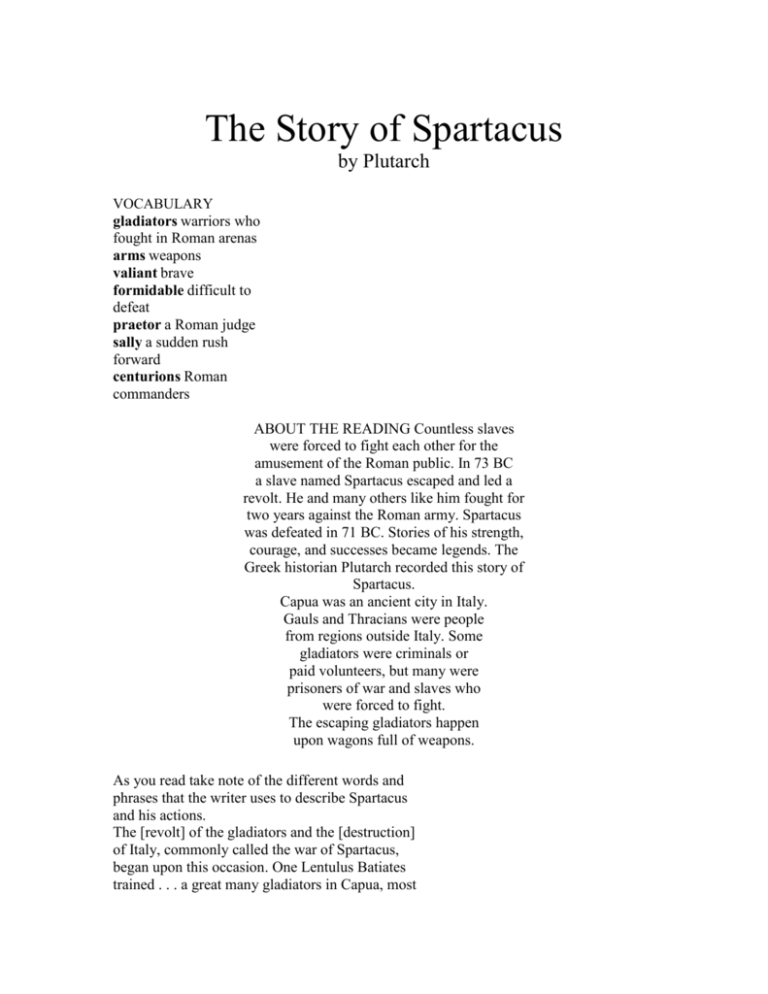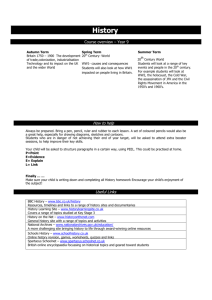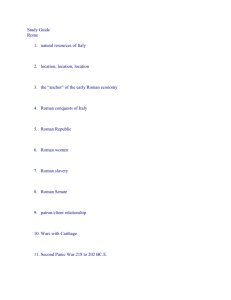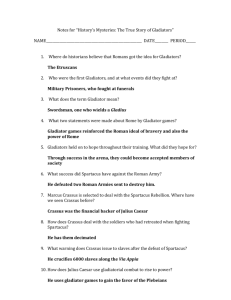
The Story of Spartacus
by Plutarch
VOCABULARY
gladiators warriors who
fought in Roman arenas
arms weapons
valiant brave
formidable difficult to
defeat
praetor a Roman judge
sally a sudden rush
forward
centurions Roman
commanders
ABOUT THE READING Countless slaves
were forced to fight each other for the
amusement of the Roman public. In 73 BC
a slave named Spartacus escaped and led a
revolt. He and many others like him fought for
two years against the Roman army. Spartacus
was defeated in 71 BC. Stories of his strength,
courage, and successes became legends. The
Greek historian Plutarch recorded this story of
Spartacus.
Capua was an ancient city in Italy.
Gauls and Thracians were people
from regions outside Italy. Some
gladiators were criminals or
paid volunteers, but many were
prisoners of war and slaves who
were forced to fight.
The escaping gladiators happen
upon wagons full of weapons.
As you read take note of the different words and
phrases that the writer uses to describe Spartacus
and his actions.
The [revolt] of the gladiators and the [destruction]
of Italy, commonly called the war of Spartacus,
began upon this occasion. One Lentulus Batiates
trained . . . a great many gladiators in Capua, most
of them Gauls and Thracians, who, not for any fault
by them committed, but simply through the cruelty
of their master, were kept in confinement for this
object of fighting one with another. Two hundred
of these formed to plan an escape, but being discovered,
those of them who became aware of it in
time . . . , being seventy-eight, got out of a cook’s
shop chopping-knives and spits, and made their
way through the city and lighting by the way on
several wagons that were carrying gladiators’ arms
to another city, they seized upon them and armed
themselves. And seizing upon a defensible place,
they chose three captains, of whom Spartacus was
chief, a Thracian of one of the nomad tribes, and
a man not only of high spirit and valiant, but in
Source: Plutarch’s Lives, translated by John Dryden (1631–1700).
Name Class Date
The Story of Spartacus, continued Primary Source
understanding, also, and in gentleness superior to
his condition. . . When [Spartacus] first came to be
sold at Rome, they say a snake coiled itself upon his
face as he lay asleep, and his wife, who at this latter
time also accompanied him in his flight . . . declared
that it was a sign [predicting] great and formidable
power to him. . .
Using their wits and new weapons, the gladiators
battle the Romans.
First, then, [defeating] those that came out of
Capua against them, and thus [taking] a quantity of
proper soldiers’ arms, they gladly threw away their
own as barbarous and dishonorable. Afterwards
Clodius, the praetor, took the command against
them with a body of three thousand men from
Rome, and [attacked] them within a mountain,
accessible only by one narrow and difficult passage,
which Clodius kept guarded, [surrounded] on all
other sides with steep and slippery [cliffs]. Upon
the top, however, grew a great many wild vines, and
cutting down as many of their boughs as they had
need of, they twisted them into strong ladders long
enough to reach from thence to the bottom, by
which, without any danger, they got down all but
one, who stayed there to throw down their arms,
and after this succeeded in saving himself. The
Romans were ignorant of all this, and, therefore,
coming upon them in the rear, [Spartacus and the
others] assaulted them unawares and took their
camp. . .
Wisely considering that he was not to expect to
match the force of the empire, [Spartacus] marched
his army toward the Alps, [planning], when he
had passed them, that every man should go to his
own home, some to Thrace, some to Gaul. But
[his men], grown confident in their numbers, and
puffed up with their success, would give no obedience
to him, but went about and [attacked] Italy. . .
After they have defeated Roman
soldiers and have taken the
soldiers’ weapons, the slaves
throw away their gladiator
weapons, which they think are
coarse and unworthy.
Spartacus was gentler than one
might expect of a slave trained to
fight as a gladiator.
The Roman soldiers force
Spartacus and his men into a part
of the mountain that has only one
way in or out.
Because their escape has not been
noticed, Spartacus and his followers
are able to sneak up on the
Roman soldiers and attack them
from behind.
Spartacus knows that his small
band of gladiators is outmatched
in strength and numbers by the
Roman army. He wants his soldiers
to go home.
The men with Spartacus are proud
of their success so far and think
there are enough of them to beat
the Romans. They refuse to follow
Spartacus’s advice.
Copyright © by Holt, Rinehart and Winston. All rights reserved.
14 The Roman Republic
Name Class Date
The Story of Spartacus, continued Primary Source
The leaders of Rome send out Crassus, a famous
general, with a large army to defeat Spartacus.
Spartacus . . . [went] to the mountains . . . , but
Quintius, one of Crassus’s officers . . . pursued
and overtook him. But when Spartacus rallied and
faced them, [the Roman soldiers] were [totally
beaten] and fled. . . This success, however, ruined
Spartacus, because it encouraged the slaves [not]
to obey their officers, but as they were upon the
march, [the slaves] came to them with their swords
in their hands, and [forced] them to lead them back
again . . . the very thing which Crassus was eager
for. . . [Crassus and his men] encamped very near
the enemy, and began to make [a wall to surround
them]; but the slaves made a sally and attacked
the [Roman soldiers]. As fresh supplies came in on
either side, Spartacus, seeing there was no avoiding
it, set all his army in array, and when his horse
was brought him, he drew out his sword and killed
him, saying, if he got the day he should have a great
many better horses of the enemies’, and if he lost
it he should have no need of this. And so making
directly towards Crassus himself, through the midst
of arms and wounds, he missed him, but [killed]
two centurions that fell upon him together. At last
being deserted by those that were about him, he
himself stood his ground, and surrounded by the
enemy, bravely defending himself, was cut in pieces.
WHAT DID YOU LEARN? QUESTIONS TO CONSIDER?
1. Why do you think the Roman general Crassus was eager to fight Spartacus and
his men?
2. The story about the snake resting on Spartacus’s face is one of the legends about
his life. Why do you think such hard-to-believe stories are sometimes told about
famous people?
3. List at least three different words and/or phrases that Plutarch uses to describe
Spartacus and his actions. What do these descriptions tell us about Plutarch’s
feelings toward Spartacus?
4. Most writings from the ancient world tell about those in power. Why might the
story of Spartacus, a slave and rebel, have become so popular that it was written
more than a hundred years later?






